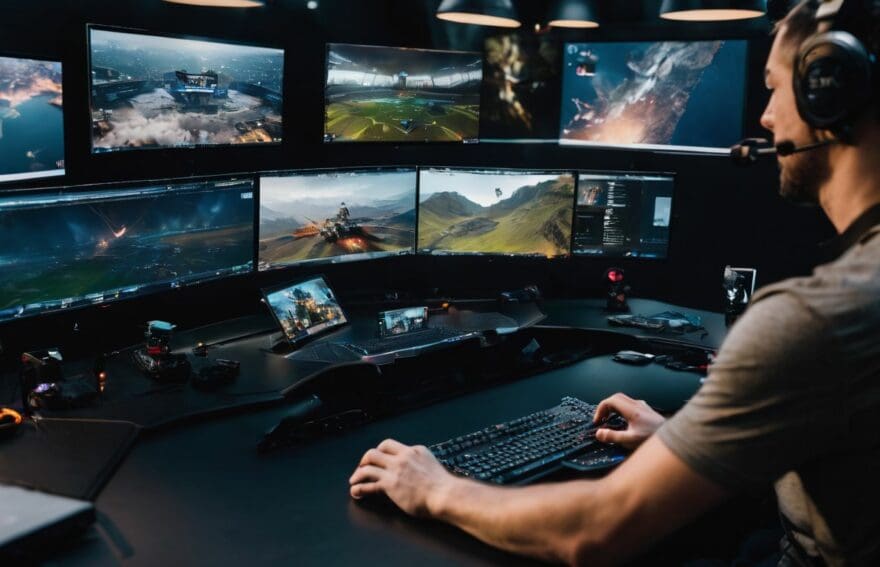Esports Coaches and Analysts: The Unsung Heroes Behind the Success

Updated On: November 18, 2025 by James Connolly
In the fiercely competitive world of esports, where every advantage is seized upon, we’ve become acutely aware of the often overlooked struggle to discern what elevates a good team to greatness.
Esports isn’t just a game; it’s an intricate dance of strategy and skill, with over a billion dollars riding on its outcome last year alone.
Delving into the heart of this digital battleground, we’ve realised that behind every split-second decision and triumphant win lies the understated brilliance of coaches and analysts.
These unsung strategists weave their quiet magic from the sidelines, shaping champions with deft insights and timely advice.
Join us as we venture into this lesser-sung narrative – where minds over matter define victory – to appreciate these essential architects in gaming’s grand coliseum. It’s time to shine a light on how they meticulously craft success – one strategic play at a time.
The Rise of Esports and the Role of Coaches
The esports industry has experienced phenomenal growth, and with it comes the increasing importance of coaches in guiding and strategising for their teams. These unsung heroes play a crucial role in shaping the success of competitive gaming.
The growth of esports industry
Esports has exploded in popularity, with audiences around the globe tuning in to watch professional gaming competitions. We’re witnessing a massive wave of investment and interest, making it one of the fastest-growing sectors in the entertainment industry.
This growth isn’t just about player numbers skyrocketing; it’s also driving demand for jobs beyond those who are competing—such as coaches, analysts, strategists, and various support roles that play a pivotal part behind the scenes.
With this rise comes an increased emphasis on structure and professionalism within teams. As we navigate this expanding landscape, careers in coaching and analysis become more sought after than ever before.
These professionals shape athletes’ development, refine skills, build resilience and devise winning strategies that elevate teams to global success. Their role is critical because they not only help foster mental wellbeing but also mold a culture of trust and collaboration among players—a foundation upon which championships are built.
The increasing importance of coaches
As the esports industry continues to grow, the increasing importance of coaches and analysts cannot be overstated. With the demand for skilled professionals rising, coaching staff are pivotal in shaping team strategy, refining player skills, and building resilience.
They play a crucial role in athlete development by fostering a supportive system that promotes trust and camaraderie within the team lineup. The significance of their expertise extends beyond just match strategy; they contribute to creating a winning team culture by mentoring players and providing invaluable guidance.
Coaches and analysts are instrumental in developing talent and driving performance through effective communication, mentorship, and strategic planning. Their ability to analyse gameplay from a broader perspective is key to enhancing team performance.
The Multi-Faceted Role of Modern Esports Coaches
Modern esports coaches play a crucial role as both strategist and analyst, managing team dynamics and motivating players to perform at their best. They also serve as mentors, imparting their wisdom and experience to help develop the next generation of esports professionals.
Strategist and analyst
Esports coaches and analysts are the masterminds behind a team’s success, meticulously crafting winning strategies and providing insightful game analysis. They delve deep into gameplay data to identify strengths, weaknesses, and opportunities for improvement.
Using AI-powered tools and their expertise, they refine players’ skills, enabling them to adapt to ever-evolving challenges within games like League of Legends. Their strategic vision is essential for creating winning game plans that lead to tournament victories.
As esports professionals themselves, coaches also play a crucial role in building resilience among players—mentoring them through setbacks and guiding them towards continuous improvement.
Their ability to manage teams effectively fosters trust and camaraderie among players, contributing to the overall success of the team on both professional and personal levels.
Team manager and motivator
Esports coaches and analysts fulfill the essential role of team manager and motivator, ensuring that players are focused, disciplined, and driven to succeed. They provide support and guidance to foster a positive team culture aimed at building resilience, refining skills, and managing the dynamics between players.
The ability to inspire trust and camaraderie among team members is crucial for their success. By creating a cohesive and collaborative environment, coaches can facilitate effective teamwork leading to victories.
Moving forward to “Data Science in Esports Coaching,” let’s explore how AI-powered tools are transforming coaching strategies in competitive gaming teams.
Mentor and teacher
Esports coaches and analysts serve as mentors and teachers to players, guiding them through skill refinement, resilience building, and strategic thinking. They provide valuable support in nurturing the potential of gamers and honing their abilities for optimal performance.
Their role extends beyond just strategizing; they actively engage in fostering a positive team culture, promoting camaraderie, trust, and shared purpose among players. Through effective communication and mentorship skills, coaches help elevate the gaming experience by offering guidance tailored to individual needs while cultivating a collaborative environment that empowers players to reach their full potential.
Utilising AI-powered tools and data science techniques enables esports coaches to offer personalised feedback on gameplay analysis. This helps in tracking training progress with advanced analytics while identifying emerging talent within the team.
Data Science in Esports Coaching
Esports coaches are now utilising advanced data science and AI-powered tools to analyse gameplay, track performance, and identify and develop talent within their teams. These technological advancements have revolutionised the way coaches approach coaching and player development in the esports industry.
Utilising data for gameplay analysis
Coaches and analysts harness AI-powered tools to gather gameplay data, enabling in-depth analysis of player performance. This data-driven approach helps identify strengths and weaknesses, allowing for targeted training sessions to enhance individual and team strategies.
By utilising such data, coaches can track progress over time, providing valuable insights into skill development and areas that require improvement.
The use of data also plays a crucial role in talent scouting and nurturing promising players. It enables coaches to identify emerging talent based on statistical performance metrics, thus contributing to the continued growth and success of competitive gaming teams.
Training and performance tracking
- Coaches and analysts closely monitor individual and team performance metrics to identify strengths and weaknesses.
- Utilising data – driven insights, they design personalised training regimes to enhance players’ skills and improve overall team performance.
- They use AI – powered tools to track progress over time, allowing for targeted adjustments to the training programme.
- Coaches and analysts also employ advanced statistical analysis to measure the impact of training on individual player performance as well as team dynamics.
- Through continual monitoring and adjustment of training plans, coaches ensure that players are constantly developing their skills for competitive success.
Identifying and developing talent
To identify and develop talent, coaches and analysts use a range of AI-powered tools to analyse gameplay, track performance, and assess players’ potential. By leveraging data science in esports coaching, they can pinpoint individual strengths and areas for improvement within the team.
This allows them to tailor their training programmes to nurture each player’s talents effectively.
Moreover, through effective communication and mentorship, coaches help cultivate an inclusive environment that encourages personal growth. They work closely with players to hone their skills while fostering a winning team culture based on mutual respect and support.
The Unsung Heroes: Shoutcasters and Production Team
The voices and faces of esports, the shoutcasters and production team play a crucial role in bringing the excitement of live broadcasts to viewers around the world. Find out more about these unsung heroes by reading our blog!
The voices and faces of esports
Esports broadcasts come alive with the energetic commentary and analysis provided by shoutcasters. Their engaging voices and in-depth knowledge of the game add excitement to the viewing experience, providing essential insight for both seasoned fans and newcomers to esports.
These experts offer play-by-play coverage, strategic analysis, and entertaining banter that enhances the appreciation of competitive gaming matches.
Aside from shoutcasters, production teams work tirelessly behind the scenes to deliver high-quality broadcasts. From camera operators capturing crucial moments to audio technicians ensuring clear sound quality, each member plays a vital role in creating a seamless viewing experience for esports enthusiasts.
Behind the scenes of live broadcasts
Esports coaches and analysts work closely with shoutcasters and the production team to ensure that live broadcasts of competitive gaming events run smoothly. They provide insights, statistics, and analysis during the matches to enhance viewer experience.
Additionally, they collaborate with AI-powered tools to gather data for real-time gameplay analysis, enabling them to offer valuable input and strategic advice to players. The behind-the-scenes support system also includes team management and communication coordination, ensuring that the broadcast showcases the best of esports.
Within these live broadcasts, analysts and strategists are pivotal in identifying key moments for highlights or commentary, adding depth and richness to viewers’ understanding of the game.
By leveraging their expertise in analysing player performance data from training sessions, they equip shoutcasters with comprehensive information about teams’ strengths and weaknesses.
The Impact of Coaches and Analysts on Esports Success
Coaches and analysts play a crucial role in the success of esports teams, from developing winning strategies to nurturing talent and creating a positive team culture. Find out more about their unsung contributions in our blog.
Case studies of successful teams
Coaches and analysts are pivotal to the success of esports teams. Let’s delve into some examples of how their guidance and strategies have led to outstanding achievements:
- In 2018, Team Liquid’s Dota 2 squad saw a remarkable transformation under the mentorship of their coach. Through meticulous gameplay analysis and strategic input, they clinched multiple championship titles.
- The Overwatch League showcased the impact of coaching when the San Francisco Shock triumphed in 2019. Their coach’s data-driven approach and team management skills were instrumental in their victory.
- The League of Legends team, G2 Esports, demonstrated the power of effective coaching in 2020 by securing numerous accolades. Their coach’s leadership and mentorship fostered a winning team culture, leading to unparalleled success.
- Team SoloMid’s rise to prominence in the competitive gaming scene was greatly influenced by their coach’s expertise in talent development and performance tracking.
- Fnatic, a renowned esports organisation, achieved unparalleled feats due to their coaching staff’s ability to strategise for success and cultivate a cohesive team environment.
- The PUBG Mobile Global Championship witnessed the astounding impact of coaches as Nova Esports emerged victorious with precise gameplay analysis and strategic insights from their coaching staff.
The importance of coaching and analysis in player performance
Coaches and analysts play a vital role in improving player performance. By using AI-powered tools, they can analyse gameplay, identify areas for improvement and develop effective strategies.
This helps players refine their skills, make better decisions during matches, and achieve peak performance. The guidance provided by coaches and analysts fosters growth within the team, creating a winning culture built on trust and shared purpose.
Utilising data science methods like tracking training progress empowers coaches to tailor individualised coaching plans for players. This approach aids in identifying talent early on while honing existing skills for competitive advantage.
Creating a winning team culture
Esports coaches and analysts play a crucial role in creating a winning team culture by fostering trust, camaraderie, and a shared sense of purpose among players. They cultivate an environment where each member feels valued and supported, encouraging open communication and collaboration.
By instilling discipline, motivation, and unity within the team, they help shape a strong culture that drives success on the virtual battlefield.
Encouraging teamwork, mutual respect, and sportsmanship are essential aspects of building a winning team culture in esports. Coaches mentor players to embrace constructive feedback, learn from failures, and celebrate victories together.
Conclusion
In conclusion, esports coaches and analysts are the unsung heroes behind the success of competitive gaming teams. Their multi-faceted role as strategists, mentors, and data analysts is vital in shaping winning team cultures and driving player performance.
As the industry continues to expand, their expertise will play an increasingly important role in elevating the standards of competitive gaming. With a growing demand for their skills, becoming an esports coach or analyst offers a promising career path within this dynamic and evolving industry.
FAQs
1. Who are the unsung heroes behind successful esports teams?
Esports coaches and analysts are the unsung heroes who work hard behind the scenes, crafting strategies and improving player performance to lead teams to victory.
2. What role do esports coaches play in a team’s success?
Esports coaches guide players, develop game plans and motivate the team to perform at their best during competitions.
3. How do analysts contribute to an esports team?
Analysts study game data, assess opponents’ tactics and provide valuable insights that help improve both individual skills and overall team strategy.
4. Can AI-powered tools assist coaches and analysts in esports?
Yes, AI-powered tools can process vast amounts of game data quickly, giving coaches and analysts richer information to fine-tune their strategies for success.



